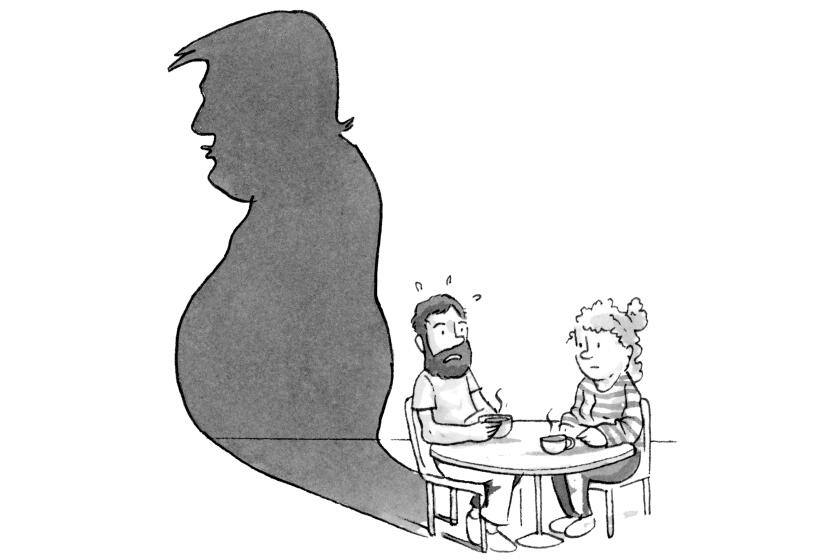Op-Ed: Blocked by racism from earning a good living, my mother ‘made a way out of no way’
I’ve spent a lifetime being proud of my mother, of her brilliant insistence that we were entitled to a stable, middle-class life — even if achieving one meant operating, as she put it, “a legitimate business that just happened to be illegal.”
My mother, Fannie Davis, was a numbers runner, which meant she ran an underground lottery business from our home. In her work, she embodied a phrase ubiquitous in Black life: “making a way out of no way.” Institutionalized, sustained and insidious racism had put many of the most humane and natural ways of making a way through life out of reach for people like my mother. She, like millions of other Black men and women, had to be wily, inventive and dogged, charting new paths to avoid racist roadblocks. She had to be twice as good, and work twice as hard for half as much, only to be resented for it.
My parents were part of the great migration of Southern Black people to Northern states, uprooting their lives in Nashville and leaving behind their extended family to move north to Detroit with two small children (one stayed behind with relatives, because three children were too much to manage in an unknown world).
For my parents and so many families like theirs, the move wasn’t an adventure; it was a last resort, an attempt to escape from the state-sanctioned terrorism of the South in the hope of acquiring basic civil liberties. They hoped to vote without intimidation, send their children to desegregated quality schools, obtain living-wage jobs. That meant starting over, just as formally enslaved men and women found themselves doing on the day after Juneteenth.
What they found was virulent northern-style racism, different, but still toxic. My parents had to contend with white slumlords who charged exorbitant rent for terrible, unsafe housing. My father couldn’t keep a job in the auto plants, which turned out to be hotbeds of racism. With her high school diploma, the only work my mother could find was cleaning for white people or toiling in a low-paying, unstable factory job. Since none of her options could elevate the family out of poverty, she decided to risk starting her underground lottery business. It was the best option available.
Black folks, as Isabel Wilkerson put it in her extraordinary book, “The Warmth Of Other Suns,” “did not dream the American Dream, they willed it into being by a definition of their own choosing.” It’s never obvious how to get there. Nor is it without enormous cost. Ambitious Black men and women like my mother have for centuries had to pursue workarounds to economic racism that have sent them to early graves. As Robin DiAngelo, author of “White Fragility,” has said: “There is something profoundly anti-Black in this culture.”
The fact that Fannie began, as has every Black American for the past 401 years, with an enormous disadvantage, meant that her triumph, her ability to acquire the means to create generational wealth for me and my children and their children, came at a rage-inducing cost.
People often wonder how my mother handled the stress of numbers running, the fear of police busts and home invasions and the threat of wipe-outs from customer wins. Those were real risks. But all of that stress stemmed from a far bigger stress in her life: being Black in America.
For her, the numbers were part of an informal economy trying to accomplish what the formal economy refused to do: pump dollars into the Black community. Those who ran the numbers referred to themselves as “race men” or “race women,” providing services that Black folks sorely needed. For one thing, numbers runners provided jobs. In New York City, for example, the numbers business employed an estimated 100,000 workers in 1971, according to the New York Times. My mother also employed dozens of young men and women during the three decades she ran her business. Numbers money contributed to Black politicians’ campaigns, buttressed fledgling chapters of the NAACP and sent Black students to college.
“And that’s what all these police busts and raids and arrests are really about,” my mother once told me. “Money.”
Cash matters. My mother used to say that she was happier when she had money, but not because she worshiped it (she didn’t) and not because she liked to hoard it (she didn’t), but because she understood that wealth was the key to the pursuit of happiness the Founding Fathers declared without irony was the right of all Americans. And she knew that when money was flowing, it gave her freedom to live the life she wanted and the liberty to share what she had freely.
Eventually, states got their way and ran their own numbers operations in the form of legal lotteries, grabbing those millions of dollars that had flowed through the informal economy and putting the money into their own coffers.
I’ve been blindsided at times by my own rage. I burst into angry tears while reading “What Is Owed” by Nikole Hannah-Jones, which lays out a powerful, undeniable argument for reparations. I wept for my mother. For what she had to go through, what she endured, what she fought against, just to gain some stability and a foothold in this place where her grandfather was born into slavery, where her ancestors worked and worked and worked as free and damn-near-free labor.
I wept for all the ways she had to make a way out of no way.
Bridgett M. Davis is the author of “The World According To Fannie Davis: My Mother’s Life In the Detroit Numbers.” She is writing the book’s screenplay adaptation for Plan B Entertainment and Searchlight Pictures.
More to Read
A cure for the common opinion
Get thought-provoking perspectives with our weekly newsletter.
You may occasionally receive promotional content from the Los Angeles Times.










